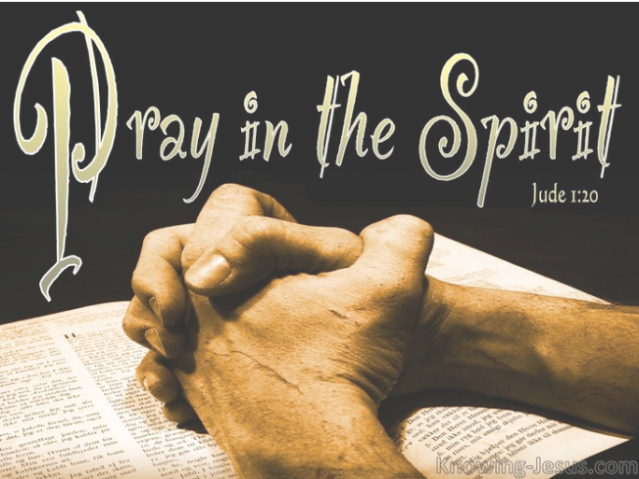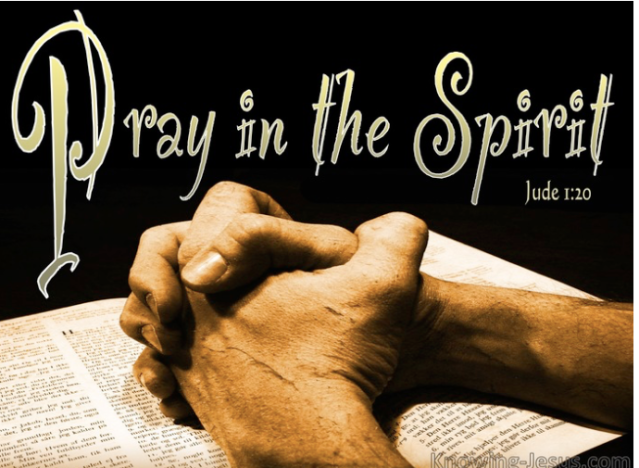But you, beloved, ought to remember the words that were spoken beforehand by the apostles of our Lord Jesus Christ, 18 that they were saying to you, “In the last time there will be mockers, following after their own ungodly lusts.” 19 These are the ones who cause divisions, worldly-minded, devoid of the Spirit. 20 But you, beloved, building yourselves up on your most holy faith, praying in the Holy Spirit, 21 keep yourselves in the love of God, waiting anxiously for the mercy of our Lord Jesus Christ to eternal life. 22 And have mercy on some, who are doubting; 23 save others, snatching them out of the fire; and on some have mercy with fear, hating even the garment polluted by the flesh. 24 Now to Him who is able to keep you from stumbling, and to make you stand in the presence of His glory blameless with great joy, 25 to the only God our Savior, through Jesus Christ our Lord, be glory, majesty, dominion and authority, before all time and now and forever. Amen. (Jude 15-25)
How do we pray in Word and Spirit? Prayer is the breath of the Christian life and nothing decays so fast in the fallen human heart as the desire to pray. In other words, nothing is more vital than prayer in Christian existence, and few things are more vulnerable to neglect.
So consider:
- prayer in your private time with God each day over the Word,
- prayer with your family at meals and in devotions,
- prayer with husbands and wives,
- prayer with roommates and friends,
- prayer in small groups,
- prayer on our daily prayerline,
- prayer in worship services,
- and all the hundreds of prayers that ascend during the day as you walk by the Spirit and breathe out your dependence on God and he breathes into you the grace of faith and life and love and joy and obedience and witness.
Remember Bruce Wilkinson’s The Prayer of Jabez? The text was 1 Chron 4:9-10, in the middle of all those genealogies. Jabez is a virtual nobody in Biblical history. But if you were going to get only a two-verse biography, what would you want written of you? Let it be this.
Jabez was more honorable than his brothers, and his mother named him Jabez saying, “Because I bore him with pain.” Now Jabez called on the God of Israel, saying, “Oh that You would bless me indeed and enlarge my border, and that Your hand might be with me, and that You would keep me from harm that it may not pain me!” And God granted him what he requested.
Bruce Wilkinson said: “If you ask me what sentence – other than my prayer for salvation – has revolutionized my life and ministry the most, I would tell you that it was the cry of a gimper named Jabez who is still remembered not for what he did, but for what he prayed, and for what happened next.”
What are you praying over and over to God in the name of Jesus that he will make of your life? What are you asking God to make of you and your time on this earth? What thing do I want God to do so much that it is there in my prayers every day?
Well. Me. My family. My kids…
But what about the bigger picture? God is the God of the whole earth and all the nations and all of history and all of life and culture and all the universe from one end of the galaxies to the other. Each of us was created to have a significant place in that great scheme. What is it? What do you pray for day in and day out about how you fit into that?
“God only give me life – only keep my heart beating – if it will cause people to hallow your name. Let your name be hallowed by my life!”
Plan to pray. Pray. Read and think and pray and plan – and then pray this year as you never have before.
In word. In Spirit.
Jude 20-21, “But you, beloved, building yourselves up on your most holy faith, praying in the Holy Spirit, keep yourselves in the love of God, waiting anxiously for the mercy of our Lord Jesus Christ to eternal life.”
Thomas Manton, the Puritan, has twenty-three pages of commentary on these two verses. He concludes with this: Prayer is a means of God’s grace designed to keep us from falling into disbelief, and to bring us safely to eternal life.
If the term “means of grace” is not part of your spiritual vocabulary, to be specific in this case: how God’s sovereign governing of all things relates to human prayer. If God runs the world according to his own holy and inscrutable wisdom, why pray for him to do one thing and not another thing?
Consider the context of this word about prayer in verse 20. There it says that we are to “pray in the Holy Spirit.” “But you, beloved, building yourselves up on your most holy faith, praying in the Holy Spirit, keep yourselves in the love of God…” What you can see from this immediate context is that building yourselves up on the foundation of faith and praying in the Holy Spirit are the way Jude wants them to keep themselves in the love of God. “By building yourselves up and praying, keep yourselves in the love of God.”
Now keeping Christians safe for eternal life is what this book is really about. That is, this little letter from Jude is about perseverance – it’s about how to fight the good fight and take hold of eternal life (1 Timothy 6:12), and how to finish the race and keep the faith (1 Timothy 4:8), and how to endure to the end and so be saved (Mark 13:13). And verses 20-21 say: This perseverance is something you do. You build yourself and others up on the foundation of faith. You pray. You keep yourselves in the love of God.
But that is only part of the context. At the beginning and the end of this little book, there is another truth, a deeper truth about perseverance – or about “keeping.” Look at verse 1: “Jude, a bond-servant of Jesus Christ, and brother of James, To those who are the called, beloved in God the Father, and kept for Jesus Christ.” Notice the word, “kept.” Here is the idea of perseverance again, only here at the beginning it is not the Christian who is keeping himself. He is being kept.
But Who Is the Keeper?
Sometimes you need the end of the story to know the full meaning of the beginning. So look at the famous doxology in verses 24-25. “Now to Him who is able to keep you from stumbling, and to make you stand in the presence of His glory blameless with great joy. . .” Now we have our perseverance attributed not to ourselves, but to someone else. Who is this? The next verse makes it crystal clear. Verse 25: “. . . to the only God our Savior, through Jesus Christ our Lord, be glory, majesty, dominion and authority, before all time and now and forever. Amen.”
So the one who is able to keep you from stumbling and to make sure you arrive in the presence of God blameless and with great joy is “God our Savior through Jesus Christ.” So God the Father is the ultimate keeper and he acts “through Jesus Christ” because the death of Jesus is the purchase price and foundation of all grace, including the grace of keeping us – that is, the grace of perseverance.
So back to verse 1. “Jude, a bond-servant of Jesus Christ, and brother of James, To those who are the called, beloved in God the Father, and kept for Jesus Christ.” The main thing to see here is that it is not we who are keeping in verse 1 or verse 24. It is God the Father through Jesus Christ. God called us, God sets his saving love upon us, and God keeps us. So now we have two truths about our being kept safe for eternal life as Christians – just as we saw last week from Romans 6:22-23. There we saw that sanctification was something we do. Here we see that our perseverance to eternal life is God’s doing (we are “kept,” verse 1; God is able to keep us, verse 24; and it is our doing – verse 21, keep yourselves in the love of God).
Over and over in the Bible we see this: God’s action is decisive; our action is dependent. And both actions are essential. So I urge you again to resist the mindset that cynically says, “If God is the decisive keeper of my soul for eternal life (verses 1, 24), then I don’t need to ‘keep myself in the love of God'” (verse 20). That would be like saying, since God is the decisive giver of life, then I don’t need to breathe. No. His keeping is decisive and our keeping is dependent on his.
The Life Breath of Prayer
Which brings us now to prayer. Prayer is the breathing of the Christian life.
Notice in verses 20-21 that prayer is one of the ways we are to keep ourselves in the love of God. “But you, beloved, building yourselves up on your most holy faith, praying in the Holy Spirit, keep yourselves in the love of God.” Shortened down, it says, “By praying, keep yourselves in the love of God.” So the effort to “keep ourselves in the love of God” (verse 21 is the means God uses to keep us safe for eternal life. And praying is one way we keep ourselves in the love of God (“praying, keep yourselves in the love of God”). Therefore, prayer is a crucial and essential means of grace that God ordains to keep us safe for eternal life.Prayer is utterly crucial to your life. Jesus said in Luke 21:36, “Keep on the alert at all times, praying that you may have strength to escape all these things that are about to take place, and to stand before the Son of Man.” Pray that you may be able to stand before the Son of Man at the Last Day. Prayer is a means of persevering to the end in faith and standing with joy before the King of the universe.
Consider whether your life of prayer this past year has reflected the seriousness of these verses and what changes you might make. Take the challenge of Bruce Wilkinson and be like Jabez. Lay hold on God for some great biblical vision for your life on this earth and don’t let go until you have it from his merciful hand.
This is where Word and Spirit meet.

